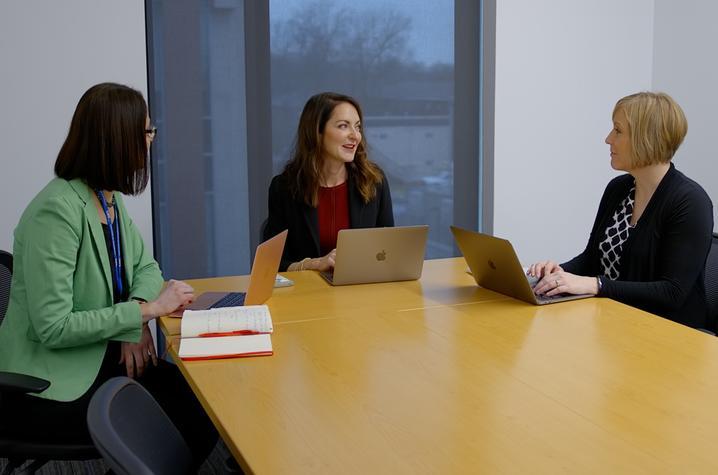 University of Kentucky Assistant Professor of Sociology Mairead Moloney is interested in why women who are middle age and older sleep less than the general population – specifically women in Appalachia, who have some of the highest rates of insomnia in the nation.
University of Kentucky Assistant Professor of Sociology Mairead Moloney is interested in why women who are middle age and older sleep less than the general population – specifically women in Appalachia, who have some of the highest rates of insomnia in the nation.
Moloney wanted to conduct a comprehensive study to learn more about insomnia among women in Appalachia and help address this health disparity, but a sleep intervention study examining cognitive behavioral therapy and sleep medication use was out of her expertise.
Through UK's Building Interdisciplinary Research Careers in Women's Health program, Moloney met UK Associate Professor of Pharmacy Daniela Moga and Assistant Professor of Psychology Christal Badour, whose expertise and research backgrounds were a perfect fit to collaborate on the project.
Funded by the National Institute on Drug Abuse and the Office of Research on Women’s Health at the National Institutes of Health, BIRCWH gives UK scholars training, collaboration and mentoring opportunities that enable them to develop independent research programs in women’s health. Since 2000, it has helped forge several interdisciplinary research partnerships across campus just like Moloney, Badour and Moga’s.
After the three met through interdisciplinary program, they successfully competed for pilot funding through UK’s Igniting Research Collaborations program also received support from UK’s Center for Clinical and Translational Science.
Their research to examine and improve women’s sleep habits sheds light on insomnia among middle-aged women in Appalachian Kentucky. It also highlights a promising non-pharmaceutical intervention that could help them – and others suffering from sleepless nights – get a good night’s rest.
According to the Centers for Disease Control and Prevention, one in three U.S. adults get less than the recommended amount of sleep. Insomnia, which is linked with many chronic diseases such as Type 2 diabetes, heart disease, obesity and depression, is even more prevalent in Appalachian Kentucky, which is an area of health care shortage.
In the study, 38 Appalachian women with insomnia were asked to use an online program called SHUTi for six weeks. The educational program, short for “Sleep Healthy Using the Internet,” examined their sleep beliefs and behaviors. The women completed online sleep diaries through SHUTi, which then customized a sleep window for each.
After the trial, they experienced a tremendous positive change in their sleep patterns – and their well-being.
“Not only did it significantly improve their insomnia and sleep quality, it also reduced their depression symptoms, perceived stress and their sleep medication use,” said Moloney, who is the project’s principal investigator. “So in all, we were thrilled that it not only improved their sleep, but all of these other excellent measures of health and well-being.”
There is growing evidence that sleep aids are harmful for long-term use as they are linked to dementia and reduced cognitive function in older adults. But tools like SHUTi could help people achieve healthy sleep patterns without relying on medication, says Moga.
“In rural areas like Appalachia where there is a shortage of health care providers, these medications might be what women turn to when they try to improve their sleep habits,” said Moga. “Our research shows that a non-pharmacological intervention like SHUTi could potentially help them cut down their medication use, while still being easily accessible.”
Moloney, Moga and Badour plan to scale up the intervention in 2020 to reach a larger sample of women and modify SHUTi based on the feedback they received in the first round of research. They also plan to include a control measure and deprescribing intervention to help further reduce sleep medication use.
Their study is just one of many UK research collaborations to have stemmed from BIRCWH. In its 19-year history, 37 scholars have secured 120 grants and contracts as principal investigators, totaling more than $45 million.
In 2017, UK received renewed funding for the program with a five-year, $2.5 million grant that will sustain these research collaborations that are positively impacting women’s health in Kentucky and beyond.
“It’s been a wonderful experience, both for the project, but also just thinking about connecting with other researchers on campus who have a shared interest in women’s health,” said Badour. “I would encourage any junior faculty at UK who have an interest in women’s health research to consider BIRCWH, both from supporting the research, but also making incredible collaborations going forward.”
